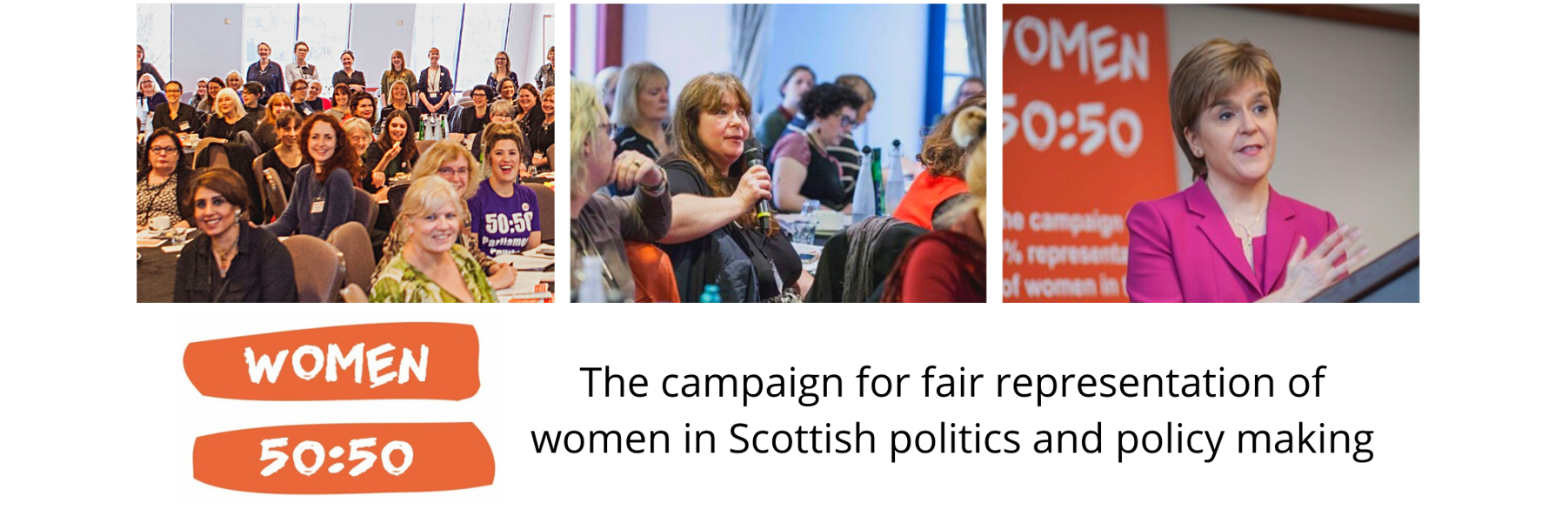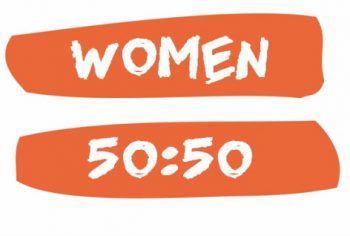Women 50:50 and culture change in politics is the goal – equal representation for women in politics by numbers and cultures where all women, from marginalised backgrounds feel safe to fully participate. But how do we go about getting to the numbers at the very least? If it were going to happen of its own accord it surely would have done by now, but instead the figures remain obstinately disappointing. Despite the fact that women are actually a small majority of the population, they currently make up 36% of MSPs, 34% of MPs (and only 30.5% of Scottish MPs), and 29% of councillors in Scotland. Clearly action is required. What are the barriers to women’s equal participation in politics, and what are the main parties doing to address them?
A key question is who gets to run for office in the first place. After all, the electorate can’t vote for women if there are no women candidates on the ballot paper. Parties need to ensure that they put women forward, and that local branches overcome a traditional reluctance to choose a woman as their candidate. This is where All-Women Shortlists come in. Quite controversial when the Labour party first used them in the 1990s (weren’t they discriminatory against men? Or patronising to women? Did they exclude talented male candidates?) they are now generally recognised as a useful way to increase the presence of women in parties’ candidate lists. Of the five parties currently represented in Holyrood, only the Conservatives do not use AWS.
There’s more to it than just having a quota of women candidates, though: they need to be contesting seats in places where they have a realistic chance of actually being elected. There’s no point in having initiatives to promote women if they somehow all end up running against incumbent MSPs with comfortably huge majorities. Labour, the Greens and the Lib Dems are aware of this, and have all used some form of AWS in half of their most “winnable” seats in the upcoming elections. The SNP’s practice of using AWS whenever an incumbent retires gives its new women candidates the advantage of contesting a seat the party currently holds.
The way the Scottish Parliament is structured, with regional MSPs chosen by proportional representation, offers parties another way to show their commitment to gender equality. For each region, each party has a list of potential MSPs: the more votes a party gets, the more of its “list” candidates are elected – so if parties deliberately put women at the top of their regional lists, then more women will be elected. If a party is aiming for equality, then the names on its list will alternate between men and women; if it wins an even number of a region’s seats, half of those chosen will be women. This is known as “zipping” – think of how the teeth from each side of a zip interlace – and it’s been used (or at least approved in principle) by Labour, the Greens, SNP and Lib Dems during the 2016 election. The LibDems have made a point of dividing the top spots in their lists equally between men and women, whereas Labour’s plans to have women top all their lists are apparently falling foul of equality requirements.[1] (We can’t run the risk of there being more women than men, can we? That wouldn’t be fair!) The Greens have no such concerns ahead of 2021, and plan to have women candidates in all their winnable seats except those where men are incumbents.
All this, though, assumes that women want to stand in the first place. There can be no all-women shortlists without sufficient women actually willing to put themselves forward, and political structures are not always supportive, or sufficiently adaptable to women’s needs. Holyrood’s working hours may be more family-friendly than Westminster’s, but the demands of the job are still huge, and not really compatible with the caring responsibilities undertaken by so many women. The professional political classes skew heavily towards the middle-class, white, able-bodied, and male, so perhaps it’s not surprising that so few women who are working-class, BAME, or disabled see themselves in these roles. The Scottish Parliament has never had a black MSP, and its few Asian MSPs have all been men. Another factor discouraging women is that every woman in the public eye expects to deal with misogynist abuse, particularly online; we can hardly blame any woman who doesn’t want to subject herself to that. It is even worse when racism is added to the misogyny.[2]
All the parties realise that they need to work actively to encourage women, and particularly BAME women, into the political arena. Women from all the main parties have supported cross-party initiatives such as the Parliament Project, and indeed Women 50:50, which aim to get more women elected. The Conservatives may not go in for zipping or AWS, but they do have their “Women2Win” programme offering training, networking and financial support. The Greens and LibDems also recognise that finance is a factor, and offer bursaries for potential candidates and help with childcare expenses. Labour reference “outreach and training” activities for candidates from under-represented groups, while the SNP mention adding minority candidates to constituency lists, and the possibility of “reserved political positions” for minority communities. The success of these schemes, however, is being called into question: “Despite quality @SNPBAME candidates standing for selection, this did not translate into candidates for election. 22 stood, 1 has been selected… This will be repeated across the different political parties and clearly illustrates the barriers BAME political hopefuls face when they face the party membership, and then again the public vote.”[3] Without more concerted efforts by all the parties, it looks as if an equal, fully representative Scottish Parliament is, alas, still some way off.
[1] https://labourlist.org/2020/11/scottish-labour-made-a-promise-to-women-and-we-should-keep-it/
[2] In the six weeks prior to the June 2017 General Election, one study recorded that 45% of all abusive tweets sent to female MPs went to Diane Abbott (https://onlinelibrary.wiley.com/doi/pdf/10.1111/newe.12078)
[3] Tweets by @nnriaz, 8 & 9 November 2020. See also her recent blog on this website

